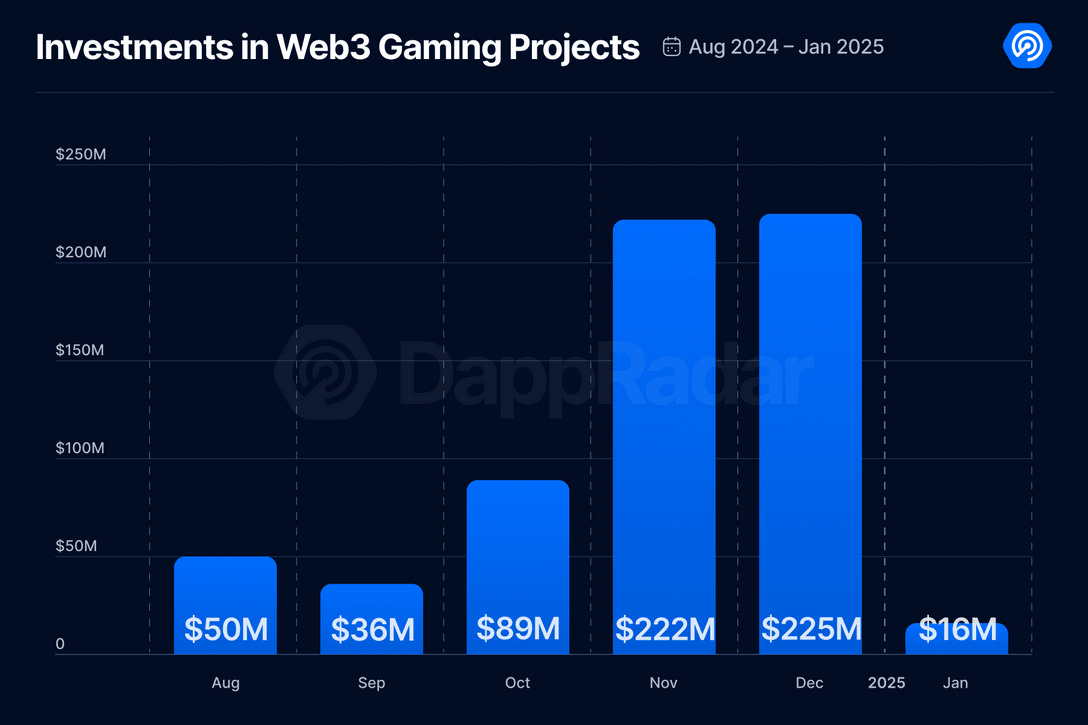Web3 gaming in 2025: Explosive growth and AI-led innovation
Discover how Web3 Gaming is exploding.
Web3 gaming is experiencing a remarkable surge, with daily active wallets skyrocketing to 7 million - an impressive 386% increase from the previous year. Major blockchain networks such as opBNB, Polygon, and Ronin are vying for dominance, while AI is reshaping the industry, ushering in a new era of innovation.
A surge in Web3 gaming: Explosive growth and industry shifts
The Web3 gaming wave is gaining momentum as user engagement skyrockets. According to DappRadar, daily active wallets (UAW) hit 7 million in January 2025, marking a staggering 386% increase year-over-year. "This growth trend highlights the strength of the Web3 gaming sector, even amidst short-term market fluctuations," noted Sara Gherghelas, an analyst at DappRadar.
What’s fueling the Web3 gaming surge?
The rapid expansion of Web3 gaming is driven by several key factors. Gabby Dizon, co-founder of Yield Guild Games (YGG), points to the maturation of Web3 infrastructure and the increasing number of new game releases.
"Many Web3 games that raised funds during the 2021–2022 bull run have spent years in development and are now launching. Many of these titles mirror traditional games but are rebuilt with Web3 mechanics," Dizon noted.
Similarly, Arief Widhiyasa, CEO of Confiction Labs, highlighted that the steady stream of high-quality games and engaged communities is making Web3 gaming more attractive to players.
Beyond the surge in new games, blockchain ecosystems are also expanding rapidly. Data from DappRadar reveals that opBNB has become the top gaming blockchain, thanks to the success of Gomble Games and Seraph in the Darkness. Matchain follows closely behind, with its gamified LOL platform fueling ecosystem growth.
Blockchain growth and the evolution of Web3 gaming
Blockchain gaming is gaining momentum, with networks like Polygon witnessing a 100% surge in gaming activity, largely driven by QORPO WORLD and Planet IX. Meanwhile, Aptos continues its steady growth, reinforcing its position in the blockchain gaming sector. Ronin, a key gaming-focused blockchain, maintains its dominance with over 630,000 daily active wallets and has now fully opened its ecosystem to developers.
Beyond blockchain expansion, Web3 games are reshaping player engagement across a variety of genres, including strategy, RPG, adventure, and simulation.
Off The Grid keeps its player base engaged with major updates like Battle Passes and co-op missions on Discord.
Pixels, a farming-adventure hybrid, exceeded 1 million DAU in 2024, cementing its status as one of Web3’s most successful titles.
World of Dypians has laid out its 2025 roadmap, introducing new quests, launchpools, staking pools, AI-driven gameplay, and character customization.
Age of Dino is rapidly gaining traction with its new point system under the Xterio Ecosystem Points initiative, offering additional in-game rewards. The game is now available on Google Play.
SERAPH: In The Darkness recently debuted its SERAPH token and launched Genesis Season 1, packed with fresh quests and rewards.
Pixudi, a blockchain-based board game on SKALE, merges traditional tabletop mechanics with Web3 features, incorporating treasure hunts, obstacle challenges, and mission-based gameplay.
From a play-to-earn perspective, Onchain Heroes on Abstract Chain is drawing attention. Players can reportedly earn up to $60 in six hours by holding NFTs and participating in gameplay. On February 22, 2025, its NFTs surged 150%, rising from 0.25 ETH to 0.65 ETH. However, the game has sparked discussions within the community, with some raising concerns about its Ponzi-like mechanics.
AI: The game-changer in Web3 gaming
According to DappRadar, artificial intelligence (AI) is becoming a transformative force in Web3 gaming, reshaping everything from game mechanics to intelligent NPC interactions.
Several projects are leading this AI-driven evolution:
Nifty Island, a user-generated Web3 gaming platform, has announced AI agent integration.
Parallel Colony, a strategic management game, is developing AI-powered characters to enhance gameplay.
Blocklords (strategy), ChronoForge (fantasy MMO), Sipher Odyssey (mobile action), and World of Dypians are all incorporating AI-driven mechanics.
KGeN has introduced NFT Proof of Gamer (POG), enabling AI avatars to evolve based on player activity.
Beyond individual games, Lightning Forge Games (LFG) is spearheading AI innovation on Avalanche, working on three AI-infused titles:
Gladiator Mayhem
YOLO
Grand Tactics Final Order
This move follows Avalanche’s success with Off The Grid and MapleStory, positioning it as a key player in AI-enhanced Web3 gaming.
Meanwhile, Yellow Panther, a major name in the space, has launched Agent YP, an AI agent designed to deliver Web3 gaming insights and alpha on X (Twitter). The company envisions Agent YP evolving into an in-game interactive NPC, possibly even participating in real-time battles and live-streaming matches.
However, experts caution that many projects are merely labeling themselves as AI-powered without genuinely integrating the technology in a meaningful way.
Challenges facing Web3 gaming
Despite its rapid growth, Web3 gaming still grapples with significant challenges. One of the most pressing issues is investment trends. While 2024 saw $1.8 billion flow into blockchain gaming and metaverse projects, this marks a 38% decline compared to the previous year.
Entering 2025, investment flows remain cautious, with only $16 million poured into the sector in January—a sharp drop from $222 million in December 2024. According to Sara Gherghelas from DappRadar, this trend reflects broader economic conditions, as funds prioritize deploying capital into previously funded projects rather than backing new ones.
Another major hurdle is mainstream accessibility. Arief Widhiyasa highlighted that one of the biggest obstacles for Web3 gaming is the lack of strong distribution channels on traditional gaming platforms like Steam and Epic Games.
Additionally, market sentiment remains a key factor. Following the U.S. presidential inauguration of Donald Trump, the crypto market’s reaction fell short of expectations, leading to a decline in many gaming-related tokens.





